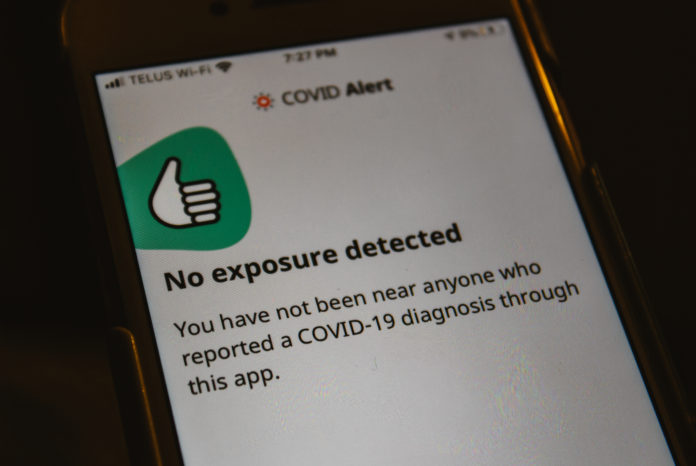
With most of the province in the orange phase of the COVID-19 recovery plan, Dr. Jennifer Russell urged New Brunswickers to download the COVID Alert app in a briefing on Jan. 29. David Shipley, chief executive officer and co-founder of Beauceron Security Inc., a company that specializes in cybersecurity, said there isn’t anything to be concerned about when it comes to privacy protections within the app.
He said since the app uses Bluetooth connectivity, it knows nothing about the individual, just the phone it’s on, the phones it’s close to and the codes put into the devices.
“Bluetooth is the same tech on your phone you often use to connect wirelessly to your car, connect to your headphones [and] it can also be used to talk to other phones,” said Shipley.

The app was released in July 2020 and alerts users when they’ve been in contact with a user who tested positive for COVID-19.
Jessie-Lynn Cross, a third-year St. Thomas University criminology and human rights student, downloaded the app and said it is beneficial.
“I downloaded it because I saw advertisements from the Government of Canada and I thought there would be no harm in downloading it,” said Cross.
According to the Government of Canada’s website, the COVID Alert app uses Bluetooth to exchange random codes between a user’s phone and nearby phones. Each day, the app checks a list of random codes from people who have informed the app they’ve tested positive for COVID-19.
The app will notify users if a phone was near them in the last 14 days from someone who tested positive. If somebody tested positive for COVID-19 then they will be issued a one-time key by their local health authority to enter into the app that will prompt a notification for devices that were near the positive case.
The COVID Alert app doesn’t use GPS or location trackers, according to the Government of Canada’s website. The website assures users there’s no way of knowing their location, name or address, phone contacts and the health information of anyone they are near to.

Cross said she isn’t concerned about being tracked or having her privacy breached.
“I’m sure that the app would not get any more information from me than what Google or Apple already has on me or the government just by searching up my [social insurance] number,” she said.
Shipley said even if someone hacked the Government of Canada and tried to look for a database from the COVID Alert app, there would be no identifiable information about Canadian individuals.
“It is inherently protecting privacy,” said Shipley. “It only collects the data necessary to perform the function that you’ve specifically authorized it to do.”
As of Jan. 31, there were almost 6.5 million downloads and almost 18,000 one-time keys entered.
Shipley also said it is unlikely someone could hack the app to make people get false notifications. He said the level of sophistication and effort required and the low probability of success doesn’t put the concern at the top of his list.
He said when you weigh the risk balance, concerns of hacking and tracking do not outweigh the risk of COVID-19.
“I use the app. I encourage people to use the app. I don’t use all apps – I’m not on Facebook, I don’t use TikTok. There’s lots of things I don’t do specifically to avoid privacy and security risks,” said Shipley. “The COVID Alert app is not one of those.”
